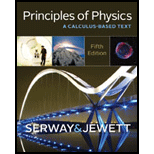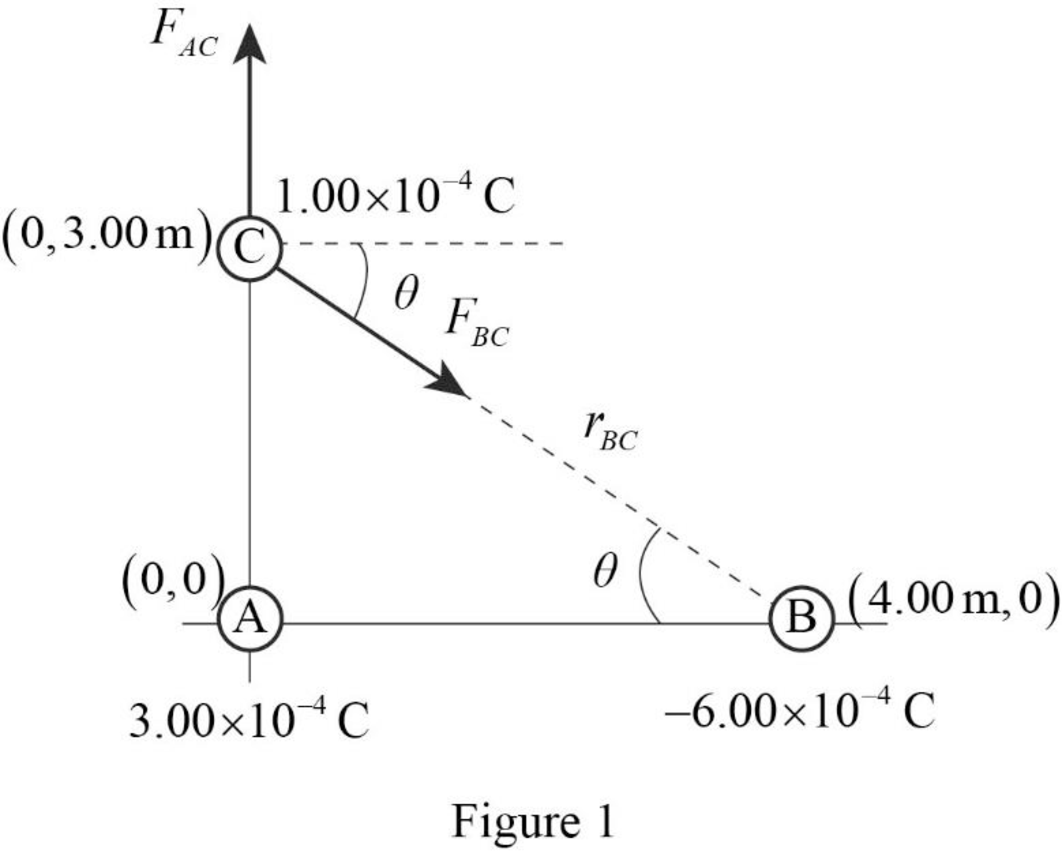
Concept explainers
Particle A of charge 3.00 × 10–4 C is at the origin, particle B of charge –6.00 × 10–1 C is at (4.00 m, 0), and particle C of charge 1.00 × 10–4 C is at (0, 3.00 in). We wish to find the net electric force on C. (a) What is the x component of the electric force exerted by A on C? (b) What is the y component of the force exerted by A on C? (c) Kind the magnitude of the force exerted by B on C. (d) Calculate the x component of the force exerted by B on C. (e) Calculate the y component of the force exerted by B on C. (f) Sum the two x components from parts (a) and (d) to obtain the resultant x component of the electric force acting on C. (g) Similarly, find the y component of the resultant force vector acting on C. (h) Kind the magnitude and direction of the resultant electric force acting on C.
(a)
The
Answer to Problem 10P
The
Explanation of Solution
Figure 1 represents the three charges A, B, and C, and the three charges are arranged in such a way that charge C is attracted by charge B, and repelled by charge A.

The distance between charge A and C is
Write the distance between charge C and B from Figure 1.
Write the angle between the horizontal and
Write the expression for component of electric force exerted by charge A on charge C.
Here,
The
Conclusion:
Therefore, the
(b)
The
Answer to Problem 10P
The
Explanation of Solution
The
Write the expression for
Here,
Conclusion:
Substitute
Therefore, the
(c)
The magnitude of electric force exerted by charge B on charge C.
Answer to Problem 10P
The magnitude of electric force exerted by charge B on charge is
Explanation of Solution
Write the expression for electric force exerted by charge B on charge C.
Here,
Conclusion:
Substitute
Therefore, the magnitude of electric force exerted by charge B on charge is
(d)
The
Answer to Problem 10P
The
Explanation of Solution
From subpart (b) the magnitude of force exerted by charge B on charge C is
Write the expression for
Here,
Conclusion:
Substitute
Therefore, the
(e)
The
Answer to Problem 10P
The
Explanation of Solution
From subpart (b) the magnitude of force exerted by charge B on charge C is
Write the expression for
Here,
Conclusion:
Substitute
Therefore, the
(f)
The sum of
Answer to Problem 10P
The sum of
Explanation of Solution
Write the expression for sum of
Here,
Conclusion:
Substitute
Therefore, The sum of
(g)
The sum of
Answer to Problem 10P
The sum of
Explanation of Solution
Write the expression for sum of
Here,
Conclusion:
Substitute
Therefore, the sum of
(h)
The magnitude and direction of the resultant electric force acting on charge C.
Answer to Problem 10P
The magnitude of the resultant electric force acting on charge C is
Explanation of Solution
Write the expression for magnitude of resultant electric force acting on charge C.
Here,
Write the expression for direction of the resultant electric force acting on charge C.
Here,
Conclusion:
Substitute
Substitute
Therefore, The magnitude of the resultant electric force acting on charge C is
Want to see more full solutions like this?
Chapter 19 Solutions
Principles of Physics
- A particle with charge q on the negative x axis and a second particle with charge 2q on the positive x axis are each a distance d from the origin. Where should a third particle with charge 3q be placed so that the magnitude of the electric field at the origin is zero?arrow_forwardTwo particles with charges q1 and q2 are separated by a distance d, and each exerts an electric force on the other with magnitude FE. a. In terms of these quantities, what separation distance would cause the magnitude of the electric force to be halved? b. In terms of these quantities, what separation distance would cause the magnitude of the electric force to be doubled?arrow_forwardPanicle A of charge 3.00 104 C is at the origin, particle B of charge 6.00 104 C is at (4.00 m, 0), and panicle C of charge 1.00 104 C is at (0, 3.00 m). (a) What is the x-component of the electric force exerted by A on C? (b) What is the y-component of the force exerted by A on C? (c) Find the magnitude of the force exerted by B on C. (d) Calculate the x-component of the force exerted by B on C. (e) Calculate the y-component of the force exerted by B on C. (f) Sum the two x-components to obtain the resultant x-component of the electric force acting on C. (g) Repeat part (f) for the y-component. (h) Find the magnitude and direction of the resultant electric force acting on C.arrow_forward
- Panicle A of charge 3.00 104 C is at the origin, particle B of charge 6.00 104 C is at (4.00 m, 0), and panicle C of charge 1.00 104 C is at (0, 3.00 m). (a) What is the x-component of the electric force exerted by A on C? (b) What is the y-component of the force exerted by A on C? (c) Find the magnitude of the force exerted by B on C. (d) Calculate the x-component of the force exerted by B on C. (e) Calculate the y-component of the force exerted by B on C. (f) Sum the two x-components to obtain the resultant x-component of the electric force acting on C. (g) Repeat part (f) for the y-component. (h) Find the magnitude and direction of the resultant electric force acting on C.arrow_forwardA circular ring of charge of radius b has a total charge q uniformly distributed around it. Find the magnitude of the electric field in the center of the ring. (a) 0 (b) keq/b2 (c) keq2/b2 (d) keq2/b (e) None of these answers is correct.arrow_forwardA point charge of 4.00 nC is located at (0, 1.00) m. What is the x component of the electric field due to the point charge at (4.00, 2.00) m? (a) 1.15 N/C (b) 0.864 N/C (c) 1.44 N/C (d) 1.15 N/C (e) 0.864 N/Carrow_forward
- Consider a thin, spherical shell of radius 14.0 cm with a total charge of 32.0 C distributed uniformly on its surface. Find the electric field (a) 10.0 cm and (b) 20.0 cm from the center of the charge distribution.arrow_forwardIs it possible for a conducting sphere of radius 0.10 m to hold a charge of 4.0 C in air? The minimum field required to break down air and turn it into a conductor is 3.0 106 N/C.arrow_forwardA 1.75-nC charged particle located at the origin is separated by a distance of 0.0825 m from a 2.88-nC charged particle located farther along the positive x axis. If the 1.75-nC particle is kept fixed at the origin, where along the positive x axis should the 2.88-nC particle be located so that the magnitude of the electrostatic force it experiences is twice as great as it was in Problem 27?arrow_forward
- Three charged particles are located at the corners of an equilateral triangle as shown in Figure P19.9. Calculate the total electric force on the 7.00-C charge.arrow_forwardFind an expression for the magnitude of the electric field at point A mid-way between the two rings of radius R shown in Figure P24.30. The ring on the left has a uniform charge q1 and the ring on the right has a uniform charge q2. The rings are separated by distance d. Assume the positive x axis points to the right, through the center of the rings. FIGURE P24.30 Problems 30 and 31.arrow_forwardA circular ring of charge with radius b has total charge q uniformly distributed around it. What is the magnitude of the electric field at the center of the ring? (a) 0 (b) keq/b2 (c) keq2/b2 (d) keq2/b (e) none of those answersarrow_forward
 Physics for Scientists and Engineers with Modern ...PhysicsISBN:9781337553292Author:Raymond A. Serway, John W. JewettPublisher:Cengage Learning
Physics for Scientists and Engineers with Modern ...PhysicsISBN:9781337553292Author:Raymond A. Serway, John W. JewettPublisher:Cengage Learning Physics for Scientists and EngineersPhysicsISBN:9781337553278Author:Raymond A. Serway, John W. JewettPublisher:Cengage Learning
Physics for Scientists and EngineersPhysicsISBN:9781337553278Author:Raymond A. Serway, John W. JewettPublisher:Cengage Learning Principles of Physics: A Calculus-Based TextPhysicsISBN:9781133104261Author:Raymond A. Serway, John W. JewettPublisher:Cengage Learning
Principles of Physics: A Calculus-Based TextPhysicsISBN:9781133104261Author:Raymond A. Serway, John W. JewettPublisher:Cengage Learning College PhysicsPhysicsISBN:9781305952300Author:Raymond A. Serway, Chris VuillePublisher:Cengage Learning
College PhysicsPhysicsISBN:9781305952300Author:Raymond A. Serway, Chris VuillePublisher:Cengage Learning College PhysicsPhysicsISBN:9781285737027Author:Raymond A. Serway, Chris VuillePublisher:Cengage Learning
College PhysicsPhysicsISBN:9781285737027Author:Raymond A. Serway, Chris VuillePublisher:Cengage Learning Physics for Scientists and Engineers: Foundations...PhysicsISBN:9781133939146Author:Katz, Debora M.Publisher:Cengage Learning
Physics for Scientists and Engineers: Foundations...PhysicsISBN:9781133939146Author:Katz, Debora M.Publisher:Cengage Learning





